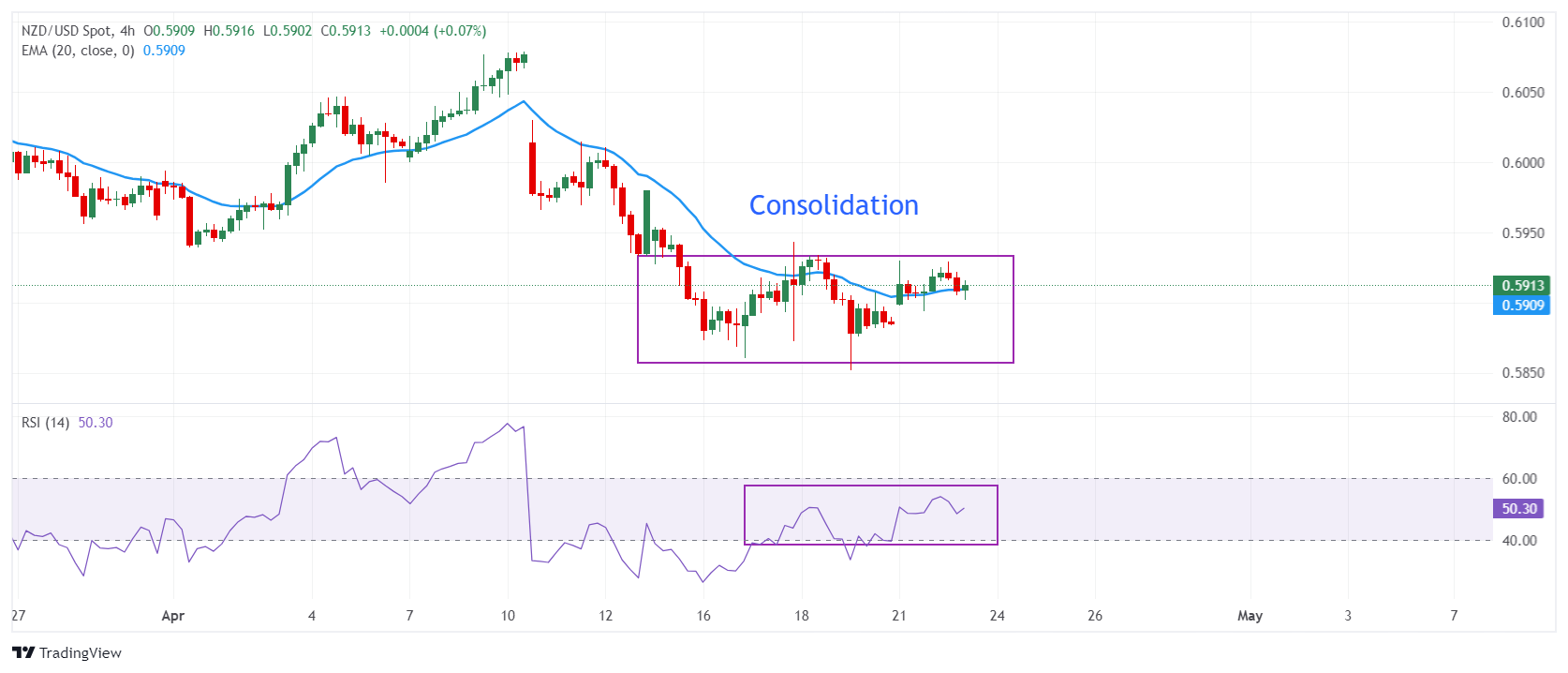- NZD/USD falls to 0.5900 even though the US Dollar remains sideways.
- Investors await the US core PCE Price Index that will influence speculation for Fed rate cuts.
- NZD/USD consolidates in a 0.5850-0.5933 range for almost a week.
The NZD/USD pair drops to near the crucial support of 0.5900 in Tuesday’s European session while attempting to break above the immediate resistance of 0.5930. A sideways performance is anticipated from the Kiwi asset as investors await the United States core Personal Consumption Expenditure Price Index (PCE) data for March, which will be published on Friday.
The inflation data will be keenly watched as it will provide cues about when the Federal Reserve (Fed) could start reducing interest rates. The inflation data will influence the Fed’s guidance on interest rates, which will be provided in next week’s monetary policy meeting in which key borrowing rates are widely expected to remain unchanged in the range of 5.25%-5.50%.
Market sentiment remains cheerful as investors expect that conflicts between Iran and Israel will not widen further. S&P 500 futures have posted significant gains in the London session, portraying higher investors’ risk-appetite. 10-year US Treasury yields hovers near 4.63% with eyes on US core PCE inflation data, which is expected to have grown steadily by 0.3% on a month-on-month basis.
The New Zealand Dollar drops despite improved appeal for risk-sensitive assets. Meanwhile, expectations for the Reserve Bank of New Zealand (RBNZ) reducing interest rates later in November remain firm. The speculation for the RBNZ pivoting interest rate cuts postponed for later this year after the Q1 Consumer Price Index (CPI) grew expectedly by 0.6%.
The NZD/USD pair has moved back and forth between 0.5850 and 0.5933 over the past week, suggesting a sharp volatility contraction. The 20-period Exponential Moving Average (EMA) at 0.5910 remains stuck to spot prices and exhibits indecisiveness among market participants.
The 14-period Relative Strength Index (RSI) oscillates in the 40.00-60.00 range, suggesting a consolidation ahead.
Fresh downside would appear if the asset breaks below April 16 low at 0.5860. This would drag the asset toward 8 September 2023 low at 0.5847, followed by the round-level support of 0.5900
On the flip side, a recovery move above March 18 high at 0.6100 will drive the pair toward March 12 low at 0.6135. A breach of the latter will drive the asset further to February 9 high around 0.6160.
NZD/USD four-hour chart
Information on these pages contains forward-looking statements that involve risks and uncertainties. Markets and instruments profiled on this page are for informational purposes only and should not in any way come across as a recommendation to buy or sell in these assets. You should do your own thorough research before making any investment decisions. FXStreet does not in any way guarantee that this information is free from mistakes, errors, or material misstatements. It also does not guarantee that this information is of a timely nature. Investing in Open Markets involves a great deal of risk, including the loss of all or a portion of your investment, as well as emotional distress. All risks, losses and costs associated with investing, including total loss of principal, are your responsibility. The views and opinions expressed in this article are those of the authors and do not necessarily reflect the official policy or position of FXStreet nor its advertisers. The author will not be held responsible for information that is found at the end of links posted on this page.
If not otherwise explicitly mentioned in the body of the article, at the time of writing, the author has no position in any stock mentioned in this article and no business relationship with any company mentioned. The author has not received compensation for writing this article, other than from FXStreet.
FXStreet and the author do not provide personalized recommendations. The author makes no representations as to the accuracy, completeness, or suitability of this information. FXStreet and the author will not be liable for any errors, omissions or any losses, injuries or damages arising from this information and its display or use. Errors and omissions excepted.
The author and FXStreet are not registered investment advisors and nothing in this article is intended to be investment advice.
Recommended content
Editors’ Picks

Gold hovers around all-time highs near $3,250
Gold is holding steady near the $3,250 mark, fuelled by robust safe-haven demand, trade war concerns, and a softer-than-expected US inflation gauge. The US Dollar keeps trading with heavy losses around three-year lows.

EUR/USD retreats towards 1.1300 as Wall Street shrugs off trade war headlines
The EUR/USD pair retreated further from its recent multi-month peak at 1.1473 and trades around the 1.1300 mark. Wall Street manages to advance ahead of the weekly close, despite escalating tensions between Washington and Beijing and mounting fears of a US recession. Profit-taking ahead of the close also weighs on the pair.

GBP/USD trims gains, recedes to the 1.3050 zone
GBP/USD now gives away part of the earlier advance to fresh highs near 1.3150. Meanwhile, the US Dollar remains offered amid escalating China-US trade tensions, recession fears in the US, and softer-than-expected US Producer Price data.

Bitcoin, Ethereum, Dogecoin and Cardano stabilze – Why crypto is in limbo
Bitcoin, Ethereum, Dogecoin and Cardano stabilize on Friday as crypto market capitalization steadies around $2.69 trillion. Crypto traders are recovering from the swing in token prices and the Monday bloodbath.

Is a recession looming?
Wall Street skyrockets after Trump announces tariff delay. But gains remain limited as Trade War with China continues. Recession odds have eased, but investors remain fearful. The worst may not be over, deeper market wounds still possible.

The Best brokers to trade EUR/USD
SPONSORED Discover the top brokers for trading EUR/USD in 2025. Our list features brokers with competitive spreads, fast execution, and powerful platforms. Whether you're a beginner or an expert, find the right partner to navigate the dynamic Forex market.




